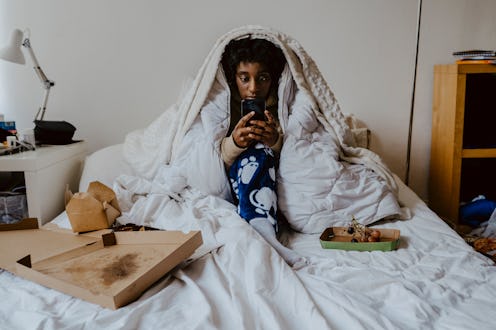Health
Tell Me Why I’m Dealing With Hemorrhoid Pain In The Prime Of My Life
How to lessen this particular pain in the ass.

Sometimes, life can be a pain in the butt — but for some people, that can turn into a very annoying medical reality. Hemorrhoids aren't exactly everyday dinner table conversation, but they're pretty common: at least half of people will have experienced them by the time they turn 50, according to Johns Hopkins Medicine. And they can be excruciatingly painful, particularly when they're outside rather than internal. Experts tell Bustle that reducing hemorrhoid pain involves several approaches, including medication and munching on fibrous veggies.
What Causes Hemorrhoids?
“Hemorrhoids are swollen blood vessels around the anus," Dr. David Cutler M.D., a family medicine physician at Providence Saint John's Health Center, tells Bustle. "Technically, these are called hemorrhoidal veins, and we all have them. But when they swell under pressure from lifting, straining, sitting or coughing, the result is what we call hemorrhoids."
There are two types of hemorrhoids: internal and external. "When the blood vessels arise from tissue covered by the lining inside the intestine, we call those internal," Dr. Cutler says. External ones, meanwhile, are under the skin, and tend to be quite painful. "Internal hemorrhoids are generally not painful, but can easily bleed," he says, which is why you might get one of the telltale signs of hemorrhoids — blood in your stool.
If you’re wondering why you’re dealing with hemorrhoids now, the pandemic may have something to do with it. "Sitting around the house, straining while coughing, and altered bowel habits associated with COVID infections could all result in a flare-up of hemorrhoids," Dr. Cutler says. Dr. Natasha Bhuyan M.D., One Medical family provider, adds that people are not eating enough fiber and so getting constipated, and they’re also not moving around as much while working from home. “A sedentary lifestyle can cause constipation, and in turn, can cause hemorrhoids,” she says.
If you do see blood when you go to the bathroom, Dr. Robert Mordkin M.D., chief medical officer of health testing company LetsGetChecked, tells Bustle, you should get medical advice. "It is also one of the presenting symptoms for bowel cancer," he says. "Only an exam performed by a physician will be able to get to the correct diagnosis." If they do diagnose you with hemorrhoids, treating them isn't a big deal, but it can be painful.
How Do You Treat Hemorrhoid Pain?
Initially, Dr. Mordkin says, your doctor will tell you to increase the amount of fiber in your diet, usually from fruits and vegetables like sweet potato and apples. For the pain, they'll also likely prescribe over-the-counter topical ointments, plus Tylenol or Advil. If you have internal hemorrhoids, Dr. Cutler says, bleeding can be controlled with medications, while you can get relief from external hemorrhoids by soaking in hot baths. "Try a warm 15 to 20 minute bath, two to three times a day," Dr. Mordkin suggests. There are sitz baths, small, shallow baths that only cover a small amount of your body, designed for this purpose if you don't feel like drawing an entire bath multiple times a day.
More serious cases, internal and external, might need surgery to clear them up; external ones might need draining, while colorectal surgery could address the source of internal bleeding. "Seeing your primary care physician can usually clarify what type of hemorrhoids you have and what is the best approach to treatment and preventing this pain in the butt in the future," Dr. Cutler says.
Experts:
Dr. Natasha Bhuyan M.D.
Dr. David Cutler M.D.
Dr. Robert Mordkin M.D.
This article was originally published on